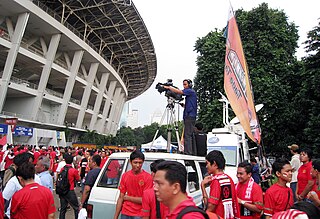Telecommunications in the Dominican Republic include radio, television, fixed and mobile telephones, and the Internet.
Egypt has long been the cultural and informational centre of the Middle East and North Africa, and Cairo is the region's largest publishing and broadcasting centre.
Telecommunication in Honduras started in 1876 when the first telegraph was introduced, continued development with the telephone in 1891, radio in 1928, television in 1959, the Internet in the early 1990s, and cellphones in 1996.

Mass media include the diverse arrays of media that reach a large audience via mass communication.

There are several types of mass media in the United States: television, radio, cinema, newspapers, magazines, and web sites. The U.S. also has a strong music industry. New York City, Manhattan in particular, and to a lesser extent Los Angeles, are considered the epicenters of U.S. media.

The media of Canada is highly autonomous, uncensored, diverse, and very regionalized. Canada has a well-developed media sector, but its cultural output—particularly in English films, television shows, and magazines—is often overshadowed by imports from the United States. As a result, the preservation of a distinctly Canadian culture is supported by federal government programs, laws, and institutions such as the Canadian Broadcasting Corporation (CBC), the National Film Board of Canada (NFB), and the Canadian Radio-television and Telecommunications Commission (CRTC).

The mass media in South Africa has a large mass media sector and is one of Africa's major media centres. While South Africa's many broadcasters and publications reflect the diversity of the population as a whole, the most commonly used language is English. However, all ten other official languages are represented to some extent or another. Afrikaans is the second most commonly used language, especially in the publishing sector.

There are several different types of mass media in the United Kingdom: television, radio, newspapers, magazines and websites. The United Kingdom is known for its large music industry, along with its new and upcoming artists. The country also has a large broadcasting, film, video games and book publishing industries.
New York City has been called the media capital of the world. The media of New York City are internationally influential and include some of the most important newspapers, largest publishing houses, biggest record companies, and most prolific television studios in the world. It is a major global center for the book, magazine, music, newspaper, and television industries. The Pew Research Center report "One-in-five U.S. newsroom employees live in New York, Los Angeles or D.C." showcases 12 percent of all U.S. newsroom employees—reporters, editors, photographers, live in New York City while only 7 percent of the U.S. working-age population lives in New York City.
Mass media of Sri Lanka consist of several different types of communications media: television, radio, newspapers, magazines, and Web sites. State and private media operators provide services in the main languages Sinhala, Tamil and English. The government owns two major TV stations, radio networks operated by the Sri Lanka Broadcasting Corporation (SLBC), and newspaper titles in Sinhala, Tamil, and English.

The mass media in Turkey includes a wide variety of domestic and foreign periodicals expressing disparate views, and domestic newspapers are extremely competitive. However, media ownership is concentrated in the hands of a few large private media groups which are typically part of wider conglomerates controlled by wealthy individuals, which limits the views that are presented. In addition, the companies are willing to use their influence to support their owners' wider business interests, including by trying to maintain friendly relations with the government. The media exert a strong influence on public opinion. Censorship in Turkey is also an issue, and in the 2000s Turkey has seen many journalists arrested and writers prosecuted. On Reporters Without Borders' Press Freedom Index it has fallen from being ranked around 100 in 2005 to around 150 in 2013.
The mass media in Taiwan is considered to be one of the freest and most competitive in Asia. Cable TV usage is high and there is also a wide selection of newspapers available covering many political viewpoints.
Media in Cambodia is largely unregulated and includes radio, television and print media outlets. Private sector companies have moved into the media sector, which represents a change from years of state-run broadcasting and publishing.

The South Korean mass media consist of several different types of public communication of news: television, radio, cinema, newspapers, magazines, and Internet-based websites.

The mass media in Indonesia consist of several different types of communications media: television, radio, cinema, newspapers, magazines, and Internet-based websites.
Media in Macau are available to the public in the forms of: television and radio, newspapers, magazines and the Internet. They serve the local community by providing necessary information and entertainment. Macau's media market is rather small. The local media face strong competition from Hong Kong.

Television, magazines, and newspapers have all been operated by both state-owned and for-profit corporations which depend on advertising, subscription, and other sales-related revenues. Even though the Constitution of Russia guarantees freedom of speech, the press has been plagued by both government censorship and self-censorship.
The mass media in Ukraine refers to mass media outlets based in Ukraine. Television, magazines, and newspapers are all operated by both state-owned and for-profit corporations which depend on advertising, subscription, and other sales-related revenues. The Constitution of Ukraine guarantees freedom of speech. As a country in transition, Ukraine's media system is under transformation.

The media in Pristina includes some of the most important newspapers, largest publishing houses and most prolific television studio. Pristina is the largest communications center of media in Kosova. Almost all of the major media organizations in Kosova are based in Pristina.

The mass media in Qatar relays information and data in Qatar by means of television, radio, cinema, newspapers, magazines and the internet. Qatar has established itself as a leading regional figure in mass media over the past decade. Al Jazeera, a global news network which was established in 1996, has become the foundation of the media sector. The country uses media to brand itself and raise its international profile.










